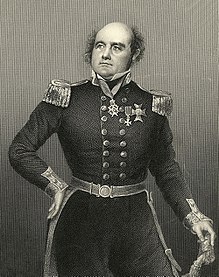
Digging through this sub-forum, I'm a little surprised that no one seems to have started a thread on last spring's AMC miniseries The Terror, a high budget Ridley Scott produced adaptation of the 2007 Simmons novel of the same name - both being imaginative (and slightly supernatural) reconstructions of the last years of the ill-fated Franklin Expedition of 1845, fairly easily the most famous and mythologized (and costly) disaster in the entire history of polar exploration.
Perhaps, because of the supernatural element, people did not think of it as "alternate history?"
And yet, a significant number of works discussed here have clear ASB premises...
But it definitely is an exercise in alternate history, one working from the advantage that we actually don't know - and almost certainly never will know - most of the history of the Franklin Expedition after it was last sighted by Europeans whalers in Baffin Bay in July 1845. All we have is one short note left in a cairn in April 1848, various Inuit oral histories, fragmentary forensic evidence, and (in the last four years) the sunken hulls of HMS Terror and Erebus. Simmons attempted to construct an imaginative narrative of what happened which was consistent with nearly all of the commonly accepted evidence of the expedition as it existed in 2006, and the miniseries mostly follows it. And it is alternative because, of course, it pretty certainly didn't happen that way.
Setting aside the supernatural element, the one obvious weighty counterfactual the book and the series seem to raise is how differently things might have played out had the expedition been given to Captain Francis Crozier rather than Sir John Franklin. Franklin was not the preferred choice of the British Admiralty to head up the expedition. In fact, he wasn't the second or the third choice, either. There were concerns about his advanced age (he was almost 60) and his rather mixed record of Arctic exploration, which was now over two decades in the past.


(Left, Captain Francis R.M. Crozier, RN; right, Captain Sir John Franklin)
Crozier, on the other hand, was in his prime, and had the fresh laurels of the historic Ross Expedition to Antarctica on his brow, having served as second in command to his best friend Sir James Clark Ross and captain of HMS Terror. He had, in fact, been in no less than four successful polar expeditions. He was as knowledgable about polar exploration as any man alive. His humble Irish birth counted against him, however. On Franklin's expedition, he would serve again as captain of the Terror, but he had no say whatsoever in personnel beyond his steward or much say in the planning of the expedition, a point he lamented in his final letter to Ross in 1845.
In the mini-series, the fatal moment is in Franklin's decision (driven by a desperate desire to rebuild his reputation) to continue on a course down the west coast of King William Island through what we now know as Victoria Strait, to reach the ice-free straits south of Victoria Island, despite a rapid build up in pack ice ahead of the ships. Had it worked, it would have completed the Northwest Passage. Victoria Strait is usually ice-bound, however, and Franklin's ships did in fact end up locked in ice pack in the strait . . which failed to thaw the next summer, or the summer after that . . . Crozier is portrayed - speculatively, but plausibly - as arguing vehemently against the decision, urging a course around the east side (Rae Strait) of King William Island. This is, in fact, how Roald Amundsen ultimately completed the Passage, as Rae Strait is usually navigable in summer, being sheltered by King William Island from excessive flow of pack ice from the north.
However the details might have played out, it is not unreasonable to think, as many have down through the years, that a Crozier-led expedition would have stood a considerably better chance of success, or in the alternative, at least a survivable and constructive failure. And this is where the alternate history exercise comes in. Because the irony in the Franklin Expedition's disaster was that far more of the Canadian Arctic was accurately surveyed in the many rescue efforts (no less than eleven major expeditions) mounted by not only the Royal Navy but also American explorers over the ensuing decade than was done, or could ever have been done, by the Franklin expedition itself. And important lessons were learned, too: these expeditions survived and experienced success despite being more modest than the lavishly equipped and manned Franklin expedition: the most successful, like that of Francis McClintock, were mostly on foot and sled, and learned from the Inuit how to live off the land, and travel on it. All of this knowledge would be critical to the success of the great Age of Polar Exploration of the late 19th and early 20th century.
How differently would polar exploration's history have played out with a Crozier-led 1845 expedition that avoided disaster? How would British and Canadian popular culture have been changed? The possible answers are not world shaking in a five-minutes-at-Midway way, but they would not be insignificant, either.
The mini-series, by the way, is highly worth watching. First rate acting. They seem to have recruited every Game of Thrones actor they could get their hands on.
Last edited: